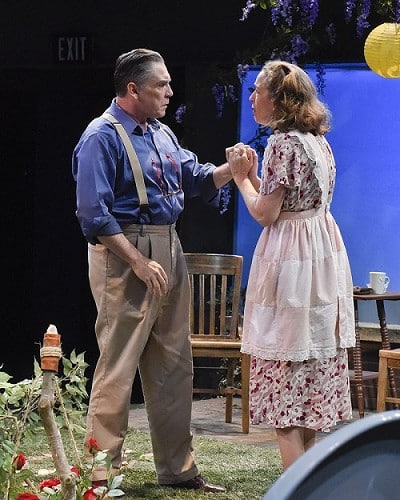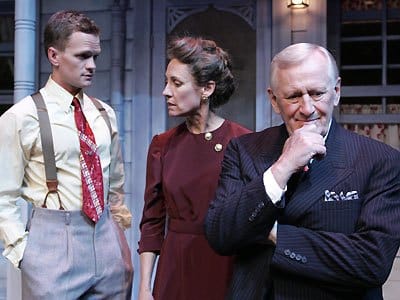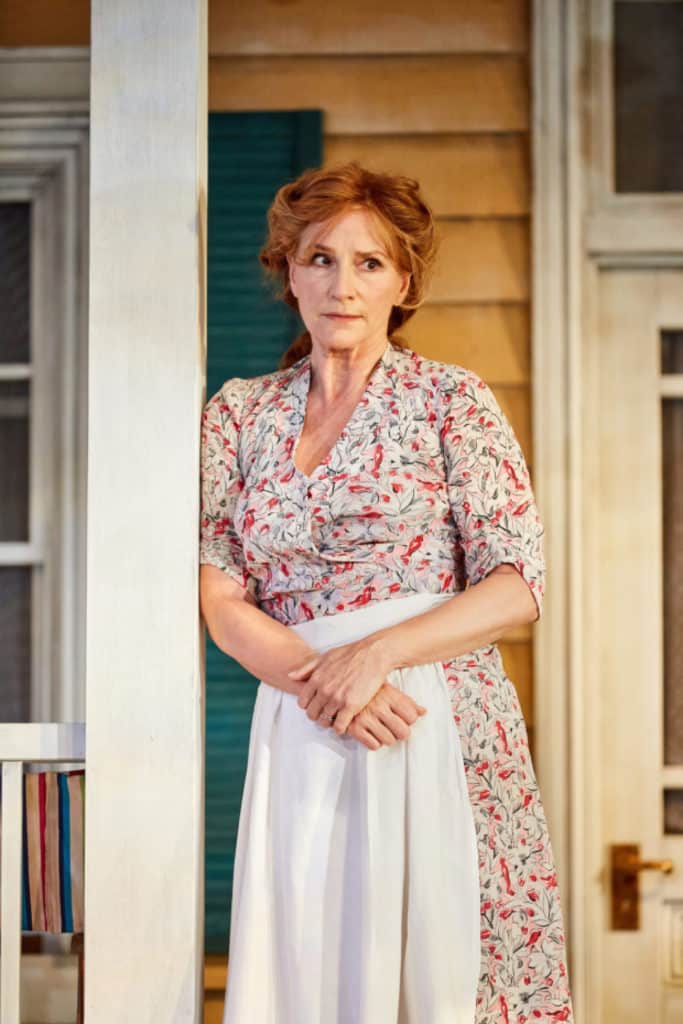Arthur Miller’s play shows the human tendency of self-deception, betrayal and guilt which leads to the worsening, and eventually, the collapse of human values. The American Dream creates false hopes and that lifestyle has led to the deterioration of many families, which the audience sees through the several conflicts that Miller had created to keep the play captivating for the audience.
The play takes place in Joe Keller’s backyard, but the location of the town is not revealed; Miller wishes to make the town seem like it could be anywhere in the United States. This town, and the family’s problems, though seemingly insignificant on the surface, is a stand-in for the troubles faced by the entire nation. Roots of these conflicts are timeless and placeless: they happen to everybody, every day, making this play a universal drama.

One of the first relationships the audience is introduced to is between Jim Bayliss and his wife, Sue. On the surface, they seem like the average happy couple, but there is undefined tension between them.
When Jim is first introduced on stage, the audience can tell that he is unhappy with his job from his remarks; when Frank says that being a doctor is an honorable profession, Jim tells him to ‘stop talking like a civics book’. Jim doesn’t want to be patronized.
His unhappiness is later shown when he says that he would love to help humanity ‘on a warner brother’s salary’. When Sue comes to tell Jim to answer the phone, she tells him, ‘don’t sniff around me’. It seems that she has a sort of power over him, which she exerts to keep her family materially comfortable. She is the pulling force behind her husband’s career.
Sue is cynical and pragmatic and seems to have a money-grubbing obsession; (to Jim) ‘It seems to me that for ten dollars you can hold his hand.’ Jim looks to be tied up under her grasp and can’t do anything about it. The audience can feel that he is constrained by the demands of post-war materialist society to make more money and to appease his wife.
The aftermath of World War II brought destruction to millions of homes and family in the U.S, and Miller explores this destructive dynamic through an average American family. The relationship of the protagonist, Joe Keller, and his son, Chris, portrays the gap in family communication and the effects of the war on the average man.
Joe Keller is a self-made businessman who wishes for his son Chris to inherit his earnings, but their conflicting relationship and juxtaposing character have led to the deterioration of honesty and communication. Miller portrays Chris to be a man that feels guilty about the money he owns because he gets it out of a business that does not value the labor it relies on, but on the other hand Joe, his father, is portrayed to be a man that will sacrifice almost anything, including his dignity, for the success of his business
Miller introduces Keller and Chris to be very different people, though physically similar. Keller is characterized as an uneducated businessman “of stolid mind and built”, who has got to where he is using his own hands. While Joe reads the want-ads in the newspaper, Chris reads the book section. Keller’s set of values are built on his remaining family. It becomes known that Keller was involved in a court case in which his factory produced cracked cylinder heads, leading to the death of twenty-one pilots.

In contrast, Chris is an idealist, his experience during the War has drastically changed his perceptions. Miller shows the closeness of their father-son relationship when Chris reveals his love for Annie.
Being the girlfriend of Larry the youngest son who went MIA, Keller sides with Kate, his wife and argues: “You marry that girl and you’re pronouncing him dead. Now, what’s going to happen to mother?” Chris sees himself above his father’s material personality. He doesn’t want his name put on the business.
“The business doesn’t inspire me,” he tells his dad; that’s why he wants to marry Ann. “If I have to grub for money all day long at least at evening I want it beautiful”. Chris hopes he can maintain a balance of making money and building a life he can believe in. However, he also suffers from survivor’s guilt from the war, which is heightened by his buried suspicion that his father might be a war profiteer.
Chris’s loyalty to his family gets the best of him and seems to be getting in the way of his happiness as he states, ‘I’ve been a good son too long, a good sucker. I’m through with it.’ Though Keller’s and Chris’s relationship is flawed, Chris still looks up to his father. When Keller gives his short monologue where he’s defending his innocence, Chris replies with “Joe McGuts” which showed his admiration for him.
Then is backed up by Annie’s comment to Chris,” You are the only one who I know who loves his parents”; Ann’s severed all ties with her father after the court case, but Chris lives in the belief of his father’s innocence.
Kate is Joe Keller’s wife and Chris Keller’s mom. Arthur Miller refers to her as “Mother,” in the script. Her motherliness is one of her defining characteristics, as Miller stresses in the stage directions preceding her first entrance, ‘Mother […] is in her early fifties, a woman of uncontrolled inspirations, and overwhelming capacity for love.

When she feels that Chris is falling for Ann, she drops unflattering hints about Ann, “I think her nose got longer” and “You gained a little weight, didn’t you, darling?
At the beginning of the play, Kate is portrayed as this helpless, desperate motherly figure, who has been deeply affected by the loss of her son. But at the end of act 1, the audience sees how articulate Kate can be.
‘Mother sits in a chair downstage, stiffly, staring, seeing’, she’s planning how to handle him. It’s up to Kate to strategize, which she can do even as everything is blowing up in her face. Joe recognizes her power and the audience does too; Kate understands the repercussions of things much more quickly.
When Chris talks about Ann, Mother listens “with an undercurrent of observation” and subtly undermines his love for her. But though she is cunning, she isn’t objective or rational. Since Larry’s disappearance, the audience sees that she’s turned to dreams, religion, and hallucinations.
It could be true that she is an insomniac, since she was up at 4 am when Larry’s tree broke down. And of course, the fact that she asked Frank to create a horoscope for Larry to see if November 25 was his favorable day. Kate’s opposition towards Ann stems from her belief that as long as Ann continues to wait for Larry, then he is alive.
Conflicts such as these have taken place, and will always take place, all the more so in capitalist society. The conflicts may come in different forms and shapes and the results are entirely dependent on the situation, but the root always remains the same.
